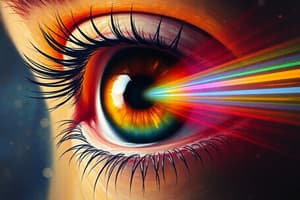Podcast
Questions and Answers
Optical illusions like Kanizsa Triangle and Penrose Stairs demonstrate how our brain fails to fill in missing information to create meaningful shapes and structures.
Optical illusions like Kanizsa Triangle and Penrose Stairs demonstrate how our brain fails to fill in missing information to create meaningful shapes and structures.
False (B)
Perception is influenced solely by sensory input from the environment, without any influence from experiences, expectations, or emotions.
Perception is influenced solely by sensory input from the environment, without any influence from experiences, expectations, or emotions.
False (B)
Top-down processing in perception involves creating individual representations influenced by neural, cognitive, and social processes, while bottom-up processing involves sensory sensations.
Top-down processing in perception involves creating individual representations influenced by neural, cognitive, and social processes, while bottom-up processing involves sensory sensations.
True (A)
The priming effect can influence perception, as shown in examples where primed individuals are less likely to see specific objects in ambiguous images.
The priming effect can influence perception, as shown in examples where primed individuals are less likely to see specific objects in ambiguous images.
The brain consciously processes around 40 out of 11 million bits of information it receives.
The brain consciously processes around 40 out of 11 million bits of information it receives.
Optische Täuschungen wie das Kanias-Dreieck und die Penrose Treppe zeigen, wie unser Gehirn unvollständige Muster ergänzt.
Optische Täuschungen wie das Kanias-Dreieck und die Penrose Treppe zeigen, wie unser Gehirn unvollständige Muster ergänzt.
Die menschliche Wahrnehmung ist ein einfacher Prozess, bei dem Sinnesorgane Informationen aufnehmen und das Gehirn interpretiert.
Die menschliche Wahrnehmung ist ein einfacher Prozess, bei dem Sinnesorgane Informationen aufnehmen und das Gehirn interpretiert.
Es gibt eine objektive Wahrnehmung, die unabhängig von individueller Interpretation entsteht.
Es gibt eine objektive Wahrnehmung, die unabhängig von individueller Interpretation entsteht.
In der Psychologie wird zwischen Bottom-up (Sinnesempfindungen) und Top-down (Sinneswahrnehmung) Verarbeitung unterschieden.
In der Psychologie wird zwischen Bottom-up (Sinnesempfindungen) und Top-down (Sinneswahrnehmung) Verarbeitung unterschieden.
Durch Priming kann die Wahrnehmung nicht beeinflusst werden, insbesondere nicht bei Bildern von Bauernhöfen oder Stränden.
Durch Priming kann die Wahrnehmung nicht beeinflusst werden, insbesondere nicht bei Bildern von Bauernhöfen oder Stränden.
Flashcards are hidden until you start studying
Study Notes
- Optical illusions like Kanizsa Triangle and Penrose Stairs demonstrate how our brain fills in missing information to create meaningful shapes and structures.
- Human perception involves all sensory organs gathering information from the environment, converting it into signals, and interpreting it in the brain.
- Perception is influenced by experiences, expectations, and emotions, leading to errors or distortions in how we perceive the world.
- Two main principles in psychology for sensory perception are Bottom-up processing (sensory sensations) and Top-down processing (creating individual representations influenced by neural, cognitive, and social processes).
- Priming effect can influence perception, as shown in examples where primed individuals are more likely to see specific objects in ambiguous images.
- Optical illusions challenge our perception, such as seeing moving patterns in static images or misjudging the lengths of lines due to surrounding context.
- Human perception is subjective, shaped by individual knowledge, experiences, and motivations, leading to self-serving biases that make it difficult to recognize errors or inappropriate behavior.- Only 40 out of 11 million bits of information are consciously processed by the brain.
- Most processing occurs subconsciously, with attention playing a crucial role in directing conscious awareness.
- Attention is like a flashlight, directing focus on specific things for conscious perception.
- Concentration involves focusing attention intensively on a task, leading to states like "Flow" where productivity peaks.
- Selective attention involves filtering out irrelevant information to focus on specific stimuli consciously.
- The brain filters sensory information in stages, from sensory register to conscious perception.
- Examples like finding a red square demonstrate how selective attention works, with challenges increasing with more complex stimuli.
- The Cocktail Party Effect illustrates how the brain subconsciously processes background information while focusing on specific stimuli consciously.
Studying That Suits You
Use AI to generate personalized quizzes and flashcards to suit your learning preferences.



